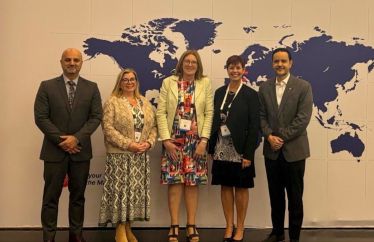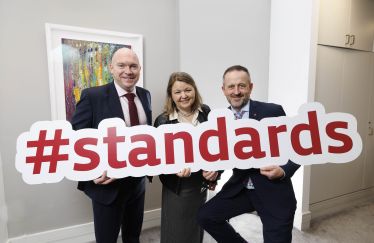World Standards Day, Thursday, October 14, 2010.
In Ireland, close to 10% of the population have a disability or a long lasting health problem¹ and more than 60% of these have more than one disability. To mark World Standards Day, whose theme is Accessibility for All, NSAI (National Standards Authority of Ireland) and NDA (National Disability Authority) has said that the issue of accessibility to products, services and the built environment has become more important than ever and that people with disabilities in Ireland should be provided with equal access to a social, political and economic life.
Speaking at the launch of World Standards Day today, Maurice Buckley, CEO, NSAI, said, “Accessibility is more than about the ability to use a lift or enter a building, it is the degree to which a product, device, service or facility is usable by as many people as possible. Standards play a huge role in making the world accessible, from technologies that are user-friendly for the hearing and visually impaired, to physical environments that are accessible to persons with physical disabilities, to products that can be easily used by older persons or those with disabilities. All of this contributes to making a difference in the lives of all people in Ireland, providing equal access to a work, social and community life.”
Since 2005, NSAI has worked closely with the NDA, Enable Ireland, the Irish Wheelchair Association and the National Council for the Blind in Ireland, as well as diverse industry and manufacturing groups, on NSAI’s Accessibility for All Standards Consultative Committee (AASCC) to improve accessibility in, for example, services, products, ICT, built environment and transport in Ireland. Members of the AASCC, including disability organisations, provide personal experiences and expertise that assist the development of standards that will enable older people or those with disabilities to access any number of activities that able bodied people take for granted.
Siobhan Barron, Director, NDA, said, “Access benefits all people and we can see this in our public transport system, where an accessible bus not only benefits people with disabilities but also people with buggies or carrying luggage. Industry, policy makers, designers and manufacturers need to think universal design and access from the onset of a project, product or service. After all, it costs the same to build an accessible house as an inaccessible house if you think access from the start.”
Since1970, World Standards Day has helped raise awareness of the importance of international standards and their role in helping meet the needs of consumer, industry and business communities. Concluded Buckley, “Anybody at any stage in life can experience temporarily reduced accessibility. When that happens, simple, everyday activities can become very complicated, that is why this year’s World Standards Day hopes to raise awareness of the critical importance of the issue of accessibility and usability.”
Resource Links:
- World Standards Day ISO Press Release
- Enable Ireland
- Irish Wheelchair Association
- National Council for the Blind in Ireland
- National Disability Authority
- NSAI’s Accessibility for All Standards Consultative Committee (AASCC)
Notes:
¹Central Statistics Office, Census, 2002 Volume 10 – Disability and Carers. Universal Design: Refers to the design and composition of an environment so that it can be accessed, understood and used to the greatest extent possible by all people, regardless of their age, size, ability or disability (Disability Act, 2005).



